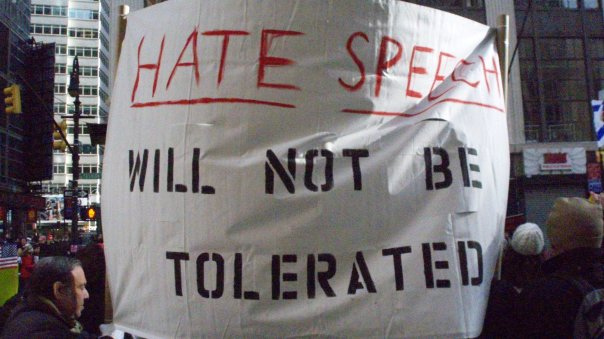In an echo chamber, language loses its power
I think evil is real. I also think we need to pay attention to language.
For example: I’m haunted by my memory from a photographic history of Jim Crow I visited in Washington D.C. more than a decade ago, especially the black-and-white image of a man’s scorched body swinging from a rope and, behind him, families eating picnic lunches amid giggling children. Notes on the lynching said some families “asked a blessing” before they ate. I think “evil” is the right word for this.
“Sticks and stones may break my bones, but words will never hurt me.” Really? It was cold the night of October 6, 1998, when two men stayed warm by beating 21-year-old Matthew Shepard, who was gay. For hours, they tortured him. When they were satisfied with their work, they left him for dead, tied to a barbed-wire fence to die alone in a freezing wind. If I search for language to describe Matthew’s final hours, I land on “evil.”
Before the lunchtime lynching, language was at work reducing a man to less-than – less than human, less than us, less than those who thanked God and broke bread. He was “just a…” (You can fill in with the N word.) Matthew Shepard was eligible for brutalities because, said one of his attackers, he was “a queer…just a fag.” Such language is an early warning that evil will follow.
The list of foul terms – from “retard” for a man who endures developmental disabilities to “slut” for a woman who protests stereotyping – is long. All are rooted in our conviction that we are worthy and they are not; we are whole and good, and they are less than we. They are the Other. When I heard a politician oppose immigration reform with reference to “wetbacks,” I heard the pitter-patter of ugliness slipping into the debate. An Other had been found, identified and demeaned. We’re on our way to moral ugliness.
Such regrettable language in political exchanges has gotten easier owing to patterns of redistricting in state after state, including Michigan. According to FiveThirtyEight’s Nate Silver, “most members of the House (of Representatives) now come from hyperpartisan districts where they face essentially no threat of losing their seat to the other party.” The Other has been redistricted away from us. We’re talking only to those who agree with us.
Of 435 Congressional districts, Silver says perhaps 35 are competitive. In the remaining 400 districts we mostly talk to ourselves. And we mostly talk about the Other. It’s easier to refer to a Republican as a “Neanderthal” when all my neighbors are Democrats, or to label the President an “African Muslim” if only anti-Obama folks are listening. It’s easier, but no better.
Sometimes our slander is nearly unconscious. My parents staunchly opposed organized labor. I was an adult before I knew that the term for an elected union executive was “leader,” not “thug.” When I went to work at Coopersville’s Rochester Products well into adulthood, I discovered I’d been misled by my parents’ language. Mike led the union and he was no thug.
Profanity isn’t much to be admired; mostly, it lacks creativity and rarely does it suggest thoughtfulness. But vulgarity itself doesn’t strike me as life-threatening. Labeling people as if they lack honor, or decency, or sincerity, or worth – that’s dangerous. The distance between such language and lynchings and beatings is dangerously short and easily traveled, especially when we’ve been redistricted into sameness.
When we castigate our political opponent as an enemy, and we throw around terms that dehumanize others, we play fast and loose with language that means something. It risks dangerous consequences because it encourages us to demonize those who have different views, who vote the other way. The fact that they differ with me does not make them less American, or less worthy, or less human. It only makes them other – different, not evil.
Almost as bad, when we attribute evil to those who are merely different, we waste a word that needs to retain its meaning. We should save certain words for when we need them. Else we’ll have no way to accurately describe rows of 1,400 bodies wrapped in white sheets, 400 of them shrouding infants and children who were freshly sleeping in their mothers’ arms.
When we call the author of such carnage “evil,” we need to mean it.
See what new members are saying about why they donated to Bridge Michigan:
- “In order for this information to be accurate and unbiased it must be underwritten by its readers, not by special interests.” - Larry S.
- “Not many other media sources report on the topics Bridge does.” - Susan B.
- “Your journalism is outstanding and rare these days.” - Mark S.
If you want to ensure the future of nonpartisan, nonprofit Michigan journalism, please become a member today. You, too, will be asked why you donated and maybe we'll feature your quote next time!


 SAY WHAT? Words really do have meaning, and distorting their meaning can have disastrous consequences. (Photo by Flickr user Ashley Marinaccio; used under Creative Commons license)
SAY WHAT? Words really do have meaning, and distorting their meaning can have disastrous consequences. (Photo by Flickr user Ashley Marinaccio; used under Creative Commons license)